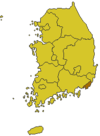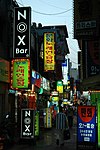Busan Travel Guide
Discover the best of Busan, from culturally significant museums and historical places to natural attractions, hiking and biking routes, delicious local cuisine, where to stay, and much more.
- Introduction to Busan
- List of Places to Visit in Busan
- Hiking/Biking Routes of Busan
- Best Things to Do in Busan: Activities and Tours
- Week-Long Itinerary for Busan
- Food and Drink Scene of Busan
- Where to Stay in Busan: Hotels, Hostels, and Guesthouses
- What to Buy in Busan: Souvenirs and Local Products to Bring Home
- Local Culture and Customs of Busan
- Best Time to Visit Busan
- Do’s and Don’ts of Busan
- Safety and Health
- Getting to Busan: Transportation Options and Logistics
- How to Get Around in Busan
- Where to Go Next from Busan: Nearby Destinations and Excursions
- Conclusion
Introduction to Busan
Busan is a bustling port city located in the southeastern corner of South Korea. Known for being the country’s second city, Busan is a hub for trade, commerce, and tourism. The city is surrounded by mountains, beaches, and green spaces, making it an excellent destination for anyone who loves outdoor adventures.
List of Places to Visit in Busan
Culturally Important Attractions: Museums and Historical Places
- Busan Museum: This museum features a range of exhibits on the history and culture of Busan, from prehistoric times to the present day.
- Haedong Yonggungsa Temple: This beautiful temple, located on the coast, is one of the few in Korea to offer an ocean view.
- Gwangalli Beach: A popular beach with locals, it is also near shopping and dining areas.
- Gamcheon Culture Village: This vibrant neighborhood, also known as “Korea’s Santorini,” is known for its colorful houses, street art, and cultural events.
Natural Attractions of Busan: Outdoor Adventures and Scenic Views
- Haeundae Beach: Known as one of the most popular beaches in Korea, it is also great for surfing.
- Taejongdae Park: A stunning park with cliffs that overlook the ocean, it has a lighthouse, a temple, and a seasonal train tour.
- Geumjeongsan Mountain Trail: This hiking trail that leads to the top of a mountain, which features panoramic views of Busan and the surrounding area.
- Yongdusan Park: An urban park with a 120-meter tower and observatory, it provides excellent views of the city skyline.
Hiking/Biking Routes of Busan
- Geumjeongsan Mountain Trail: A challenging hike
- Haeundae Dalmaji Walkway: A scenic seaside walk that overlooks Haeundae Beach and provides views of the coastline.
- Sajik Baseball Stadium and Dongnae Insect Ecological Park Trail: This hiking trail connects Sajik Baseball Stadium and the Dongnae Insect Ecological Park, which has over 1,000 species of insects.
Best Things to Do in Busan: Activities and Tours
- Sea kayaking: Rent kayaks to explore the ocean around Busan.
- Temple stay: Stay at Haedong Yonggungsa Temple to experience a day in the life of a Korean monk.
- Gamcheon Culture Village Art Tour: Join a guided tour which provides insight into its colorful buildings and street art.
- Night City Tour: Take a night tour which showcases the colorful city lights.
Week-Long Itinerary for Busan
| Day | Itinerary |
|---|---|
| 1 | Haedong Yonggungsa Temple, Yongdusan Tower Observatory |
| 2 | Taejongdae Park, Oryukdo Skywalk, Haeundae Beach |
| 3 | Beomeosa Temple, Songjeong Beach, Jangsan Mountain Trail |
| 4 | Busan Museum, Jagalchi Fish Market, Gukje Market |
| 5 | Gamcheon Culture Village, BIFF Square and Cinema Center |
| 6 | National Maritime Museum, Haedong Market, Gwangalli Beach |
| 7 | Pusan National University, Sajik Baseball Stadium, Dongrae |
Food and Drink Scene of Busan
Must-Try Dishes
- Ssiat Hotteok: Korean-style sweet pancakes filled with nuts.
- Makchang: Grilled pig or cow intestines, marinated with sauce and seasoning.
- Hoe: Korea’s raw fish dish.
Local Beverages
- Makgeolli: Korean rice wine.
- Soju: A distilled alcoholic beverage traditionally made from rice or barley.
Where to Stay in Busan: Hotels, Hostels, and Guesthouses
- Seomyeon: A bustling commercial district, Seomyeon has plenty of hotels, hostels, and guesthouses, along with shopping and dining options.
- Haeundae: Located by the beach, Haeundae is a popular area for tourists, with high-end hotels and resorts.
- Gwangan: Famous for its strikingly modern Diamond Bridge, the Gwangan area has several boutique hotels that offer alternative accommodations.
What to Buy in Busan: Souvenirs and Local Products to Bring Home
- Korean pear: Busan is especially known for its sweet and juicy pears.
- Jagalchi Fish Market souvenirs: Brushes made from fish bones, keychains, and other items made from sea creatures. -Hanbok: Traditional Korean clothing.
Local Culture and Customs of Busan
- Etiquette: Respectfulness is considered essential in Busan culture.
- Language: Korean is the official language spoken in Busan.
- Temples: Visitors should dress modestly if they plan to visit the temples and other religious sites.
Best Time to Visit Busan
The ideal time to visit Busan is during Autumn (September - November) as the weather is mild and comfortable, and the fall foliage is breathtaking.
Do’s and Don’ts of Busan
Do:
- Respect local customs and traditions.
- Try the street food.
- Learn basic Korean words and phrases.
Don’t:
- Ignore etiquette.
- Overpack, as Busan is a fashion-forward city, and you don’t want to miss an opportunity.
Safety and Health
Safety in Busan
In general, Busan is a safe city with low crime rates. It is recommended to practice caution in secluded areas and keep valuable belongings secure.
Health in Busan
Medical care is available in Busan, but it is definitely best for tourists to buy a reliable travel insurance policy before visiting.
Getting to Busan: Transportation Options and Logistics
Busan is primarily accessed by air, sea or rail, with regular flights connecting to Seoul and Jeju Island. Once in the city, the subway system, bus system, taxis and hired cars are available.
Airports Near Busan
- Gimhae International Airport: Busan’s main airport, serving both domestic and international flights.
Bus Stations Near Busan
- Central Bus Terminal: Serves buses to major cities throughout Korea and operates a few buses to Japan and China.
- Dongbu Bus Terminal: Providing intercity bus services, has a wide-ranging spectrum of destinations -**West Bus Terminal **: With many options going to the northwestern parts of South Korea.
Other Options
- Ferry: Ferries connect Busan to nearby islands and Japan.
- Trains: KTX trains run to and from Busan to other major cities in South Korea.
How to Get Around in Busan
Public transportation in Busan is efficient and includes a metro system, buses, taxis, and bikes for rent. The subway network comprises six lines and services most of the luring touristy spots across the city.
Where to Go Next from Busan: Nearby Destinations and Excursions
- Gyeongju: The ancient capital of the Silla Dynasty, Gyeongju is famous for its historic remains, such as temples and royal tombs.
- Daegu: The fourth-largest city in South Korea, Daegu is famous for its food and warmer climate.
- Jeju Island: An all-time favorite for Korean locals and tourists, this volcanic island has beautiful scenery and is a great spot for nature activities.
Conclusion
Busan is a fantastic destination for travelers seeking a mix of modernity and tradition, nature, culture and breathtaking views. With its food scene, beautiful surroundings, and authentic culture, it is a destination which should be on the radar for all kinds of travelers visiting South Korea.
Busan Image Gallery
 Busan's location in South Korea
Busan's location in South Korea
 Busan Ferry Times
Busan Ferry Times
 Busan Metro Map
Busan Metro Map
 Busan metro train
Busan metro train
 Haeundae beach in summer
Haeundae beach in summer
 Bridge to Yonggungsa Temple
Bridge to Yonggungsa Temple
 The bustling port of Busan
The bustling port of Busan
 The serenity of Beomeosa
The serenity of Beomeosa
 See the leading Asian film stars at the Busan International Film Festival
See the leading Asian film stars at the Busan International Film Festival
 The remote temple of Seokbulsa (석불사)
The remote temple of Seokbulsa (석불사)
 View of Busan, from the top of Jangsan mountain
View of Busan, from the top of Jangsan mountain
 Sajik Stadium
Sajik Stadium
 Shinsegae Busan - The largest department store in the world
Shinsegae Busan - The largest department store in the world
 Dong-nae pajeon 동래파전
Dong-nae pajeon 동래파전
 Seashells and marinated silkworms are good snack food for Busanites
Seashells and marinated silkworms are good snack food for Busanites
 Nampodong by night
Nampodong by night
 Gwangalli beach at night
Gwangalli beach at night
 The Novotel on the beach in Haeundae
The Novotel on the beach in Haeundae
 Tsunami warning sign on Haeundae beach
Tsunami warning sign on Haeundae beach
